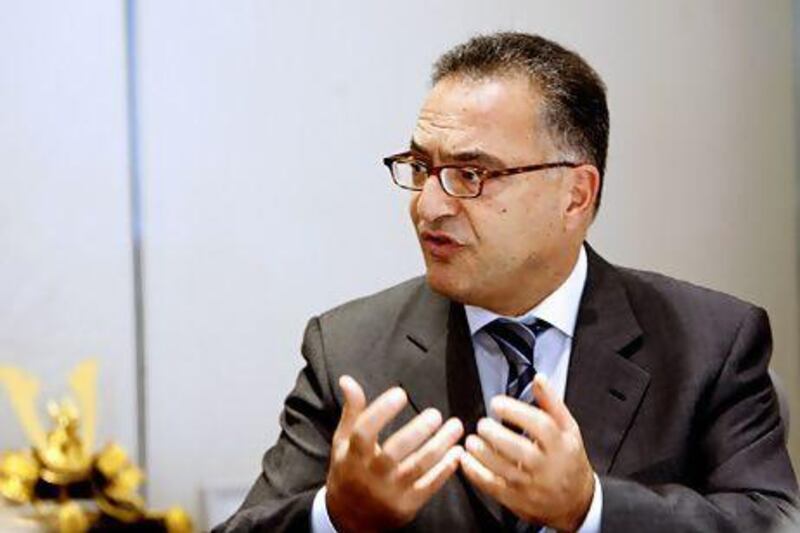The new executive configuration at the top of Al Ghurair Investment was publicly unveiled recently.
Essa Al Ghurair, the representative of one of the UAE's oldest and most prestigious business families, teamed up with Constantin Salameh, the globalised technocrat who has been named the new group chief executive of the business.
"The board decided it was the right initiative to bring in someone who can bring all the parties together under one head to spearhead it and get the best out of them," says Mr Al Ghurair.
"It's important to have a clear vision in what the board and the chairman wants to do and to execute it," said Mr Salameh.
All agreed so far on the future Al Ghurair strategy. But there are subtle, although significant differences in the background and outlooks of the two men.
Mr Al Ghurair is a scion of a family business that has been part of the spectacular development of Dubai over the past four decades.
It built the first shopping mall in the Middle East, the Al Ghurair Centre in Dubai in the 1980s, and has since been associated with grand projects such as the Dubai Metro and Burj Khalifa.
Those high-profile initiatives are complemented by other industrial, commercial and financial businesses amounting to 30 different units across 20 countries, from rice production in Pakistan to oil refining in Lybia.
Mr Al Ghurair is highly conscious of his family's place in the history of the UAE, and the value of its reputation.
"We have got to keep the reputation of the family intact," he says, before using a metaphor for the value he places on the family name: "I'd rather get cut keeping hold of the glass than drop it and see it smashed to pieces."
As vice-chairman, he has the main executive responsibility for the Al Ghurair group. The chairman, Abdul Aziz, focuses on other parts of the family business, such as Mashreq, and on his public service duties as a member of the Federal National Council.
Mr Salameh comes from a rather different background. Although now a Swiss national, his family originally came from Jerusalem, with big interests in property there. The Belgian consulate in the divided city is housed in the Villa Constantin Salameh. But they departed, first for Egypt and then Beirut.
Mr Salameh studied engineering at King's College, London, before taking a masters degree in business administration at Stanford University in California.
There followed a 19-year stint with Hewlett Packard, with responsibility for the computer giant's financial business across large parts of the world. He honed his reputation as a "can do" manager in the tough environment of the 1990s Asian financial crisis.
Then came a job with two of the biggest family investment offices in Abu Dhabi, Emirates International Investment Company and Al Masaood group. He knows how UAE business families work at the highest levels.
He will bring a more structured and focused approach to Al Ghurair's complex and diverse set-up. "The first task is to have a clear and shared direction, then develop the right structure that reflects how the businesses are working. Operations should be standardised so that synergies can be released," he says.
"We have to assess which businesses have a strong history and legacy, and which can add value to the group. We have to know which will help us maintain our goal to be in the top two positions of our chosen markets. But we can't be dominant in all sectors, so maybe we'll exit from some, but it's too early to tell," he explains.
That approach inevitably raises the prospects of Al Ghurair being divided into "core" versus "non-core" operations, as well as the possibility of closures, sales or public offerings of some of the businesses.
Other parts of the family operations have been spun off in the past, with Mashreq quoted on the Dubai Financial Market, so the concept of unbundling the conglomerate is not entirely unfamiliar.
But Mr Salameh says it is far too early to say which path the conglomerate will chose, and what will be "core".
"The criteria to prioritise our businesses are fourfold: first, the alignment with our core competences; second, the capacity of the entity to generate value; third, the question of how much synergy it will bring to the group; and finally, how can we execute the strategy within a given sector," he explains.
On the question of initial public offerings for one or some of the Al Ghurair businesses, Mr Salameh says: "There are usually two reasons for seeking an IPO: for the funding capability, and for the governance structure it imposes on the group.
"We are currently well-funded, with equity to debt ratios and the capital structure more than adequate for our needs. The equity/debt ratio is much lower than average."
On current trading, Mr Al Ghurair says: "The 2012 figures will be good, the 2013 and 2014 ones even better."
Mr Salameh agrees: "We are just finalising budgets and I will go to the board with double-digit growth, core and non-core. Al Ghurair is a multibillion dirham company, and there is great growth potential."
The group does not publish financial figures.
On governance, Mr Salameh says: "It's important we run the company in the same way as if it were a public company, with the same controls, priorities and communications.
"Accountability will filter down through the organisation."
That amounts to a less-than-enthusiastic endorsement of the full IPO package, and Mr Al Ghurair sums up the caution the family feels over the process of becoming a public company: "We don't want to upset anybody by doing an IPO.
"We have to give a good proposition to anybody who is going to buy shares in an Al Ghurair company, and we have to keep the reputation of the family intact.
"But the board has put its trust in Constantin, and only time will tell," he adds.





